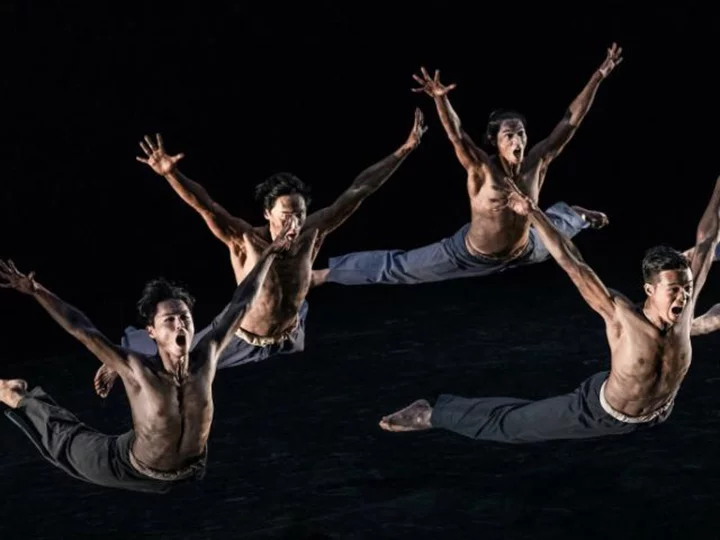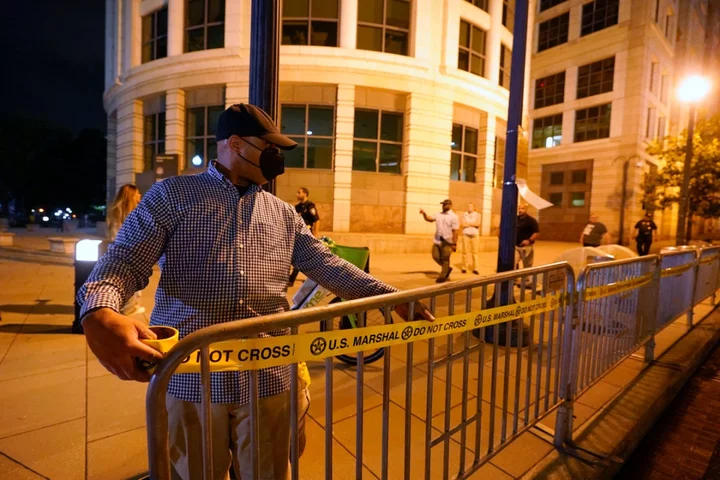Former US President Jimmy Carter's decision to switch diplomatic recognition from Taipei to Beijing sent shockwaves through Taiwan when it was announced in late 1978. With grave existential concerns arising from fears of an imminent Communist invasion from mainland China, people protested on the streets to vent their anger at America's perceived betrayal. When a US delegation arrived in Taipei for negotiations shortly after, demonstrators threw eggs at the motorcade.
In this volatile environment, Taiwan found solace in an unlikely place: a 90-minute dance that, coincidentally, premiered on the day of Carter's announcement.
Performed by the Cloud Gate Dance Theatre troupe, "Legacy" is widely considered to be the first contemporary dance to tell the story of modern Taiwan. It re-enacted the journey undertaken by the 17th-century pioneers who traveled from mainland China, via the choppy waters of the Taiwan Strait, before settling on the island.
At a time when Taiwan was searching for its own cultural identity, "Legacy" struck a chord with audiences.
"Everyone was on their feet, hands high in the air clapping emotionally," read an article in the government-run newspaper, Central Daily News, after the debut performance in the Taiwanese city of Chiayi. "Everyone's heart was tightly bound together."
Wang Yun-yu, a retired Cloud Gate dancer who performed in the 1978 premiere, recalled that some audience members were moved to tears.
"The dance was about how our ancestors came to Taiwan and made it home. It was about finding our own roots," she told CNN in a phone interview. "It closely resonated with the atmosphere of the time, which was that we no longer have the protection of the US, and we have to stand on our own feet from now on."
According to the troupe, more than 20,000 people saw "Legacy" during its first two months. In recent decades, it has been revived in response to other major national crises, serving as a rallying call following a devastating earthquake in 1999 and after the SARS outbreak in 2003, and has now been performed over 170 times — both in Taiwan and overseas. In 1993, it was performed in mainland China.
Now, two decades after its last run, "Legacy" is returning to the stage with a sold-out tour marking the dance company's 50th anniversary. At the end of April, thousands of people gathered in front of the square between Taiwan's National Theater and the National Concert Hall, in central Taipei, to watch a livestreamed performance on two huge screens.
Amid worsening relations with Beijing after Xi Jinping took power in China, there are growing parallels between Taiwan's political environment today and that in which the dance debuted.
The self-governing democracy of more than 23 million people faces an increasingly uncertain future as it embarks on its post-Covid recovery amid mounting military, diplomatic and economic pressure from across the strait.
"The timing is certainly interesting," said audience member Eleanor Chiang, a yoga instructor in her 60s who has seen the dance several times. "I guess such coincidences just happen sometimes."
China's ruling Communist Party has long claimed Taiwan as its own territory and, despite having never controlled the island, has not ruled out taking it by force. In early April, China conducted a three-day military drill around Taiwan, sending warplanes and vessels near the island after the closely watched meeting between Taiwan President Tsai Ing-wen and US House Speaker Kevin McCarthy in California.
Whereas Taiwanese felt betrayed by the US after Carter's decision, in recent years, the island has seen stronger bipartisan support from the US, with high-level congressional visits and increased arms sale.
A show of resilience
In a promotional video published ahead of the tour, Cloud Gate Dance Theatre's founder Lin Hwai-min said he would never forget the audience's response when his ensemble first presented "Legacy."
"Cheers from the crowd erupted as if waters broke the dam," he recalled.
Lin first conceived of "Legacy" while he was studying choreography in New York in the 1970s. It was a period when Taipei faced a string of diplomatic setbacks following the UN's decision to expel Taipei's representatives in favor of recognizing the Communist government in Beijing.
The political environment — and Lin's own homesickness — prompted the choreographer to explore his personal connection with the island.
Now aged 76, Lin is considered a heavyweight in the Asian contemporary dance scene — and is a household name in Taiwan. In 2019, he retired after almost half a century as Cloud Gate's art director but was brought back to oversee 2023's re-staging of "Legacy."
"Legacy" opens with dancers offering incense to honor their ancestors. This is followed by scenes depicting how settlers braved the ocean and ploughed the land, punctuated by Taiwanese folk music and the pounding drums.
The dance is known for being physically demanding. Over the course of 90 minutes, dancers leap, climb, bend, squat, roll, stamp and howl, an exhibition of raw and explosive energy that channels the everyday movements of farmers growing crops and working the land.
For Lin, the work's message of endurance and resilience allow it to transcend borders, cultures and eras. And these themes feel particularly poignant on Cloud Gate's anniversary, given how Lin built the company from scratch at a time when dancing was not taken seriously as a profession in Taiwan — and considering the troupe's recent struggles, which include a 2008 fire that decimated its studio and archive.
"Without the fighting spirit that is integral to the dance, Cloud Gate could not have lasted until today," Lin wrote in a foreword of a recently-published book, reflecting on the restaging of "Legacy."
For some audience members, such as 30-year-old Chan Wen-ju who works in the publishing industry, the performance is about "overcoming adversities" and "devotion to providing a brighter future" for the next generation.
In "Legacy's" last Taipei performance, Lin bowed to a cheering crowd, saying that all people on the island long for the same thing:
"We all wish that the wind and rain come in their time; the country prospers and the people enjoy peace."
A cultural icon
To many people in Taiwan, modern dance is almost synonymous with Cloud Gate. As the first professional contemporary dance company in Taiwan, it "not only nurtured many choreographers and dancers, but it fostered the surrounding cultural industry," said Lin Yatin (no relation to Lin Hwai-min), an associate professor of dance at the Taipei National University of the Arts.
Fusing Western and Eastern dance traditions and aesthetics, the troupe was as influenced by ballet, and the renowned American modern dancer Martha Graham as with martial arts, calligraphy, tai chi and meditation.
The company has also played a role in projecting soft power, Lin the associate professor said, at a time when the island's formal diplomatic allies continue to dwindle amid Beijing's growing pressure.
"Diplomacy sometimes has to take place through cultural diplomacy," she said.
"Through its spectacular works of dance, Cloud Gate has reached global audiences, allowing them to appreciate the culture of Taiwan and learn more about Taiwanese people."
Cloud Gate Theater continues its tour of "Legacy" tour around Taiwan until June 10.
Top image: A still of dancers performing "Legacy."









